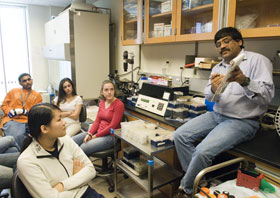  |
| HOME | THIS ISSUE | CALENDAR | GRANTS | BACK ISSUES | < BACK | NEXT > |
Future science teachers take lab course in molecular geneticsby Sherry Fisher - June 19, 2006 |
||||
|
Ten students planning to teach high school biology were immersed in molecular genetics during a recent two-week laboratory course offered by a plant science professor. The program, offered to students from the Neag School of Education teacher education program, was directed by Professor Gerald Berkowitz and funded through a research grant from the National Science Foundation. Berkowitz says the program is designed to “provide future high school science teachers with the training, tools, and subject matter to run experiential molecular genetics labs in our state’s high schools.” The program assumes students have a limited background in molecular genetics and laboratory procedures related to molecular biology. “It’s a unique training program that instructs students in a number of molecular biology methods,” says Berkowitz, noting that a special aspect of the program is learning to appreciate molecular genetics in an integrated fashion. “They learn that the information in a gene codes for a protein; that a protein works based on its structure; and that the function of the protein in a cell affects the whole organism. Students conducted experiments at all these levels.” Berkowitz says that students taking biology and chemistry classes toward their teaching degrees don’t have much opportunity to do experiments like those offered by him. “This goes beyond learning how to simply use equipment and conduct experiments,” he says. “It incorporates cutting-edge research into high school classrooms. Students receive intense training, follow experiments through from day to day, and have to analyze the results.” UConn students also benefit from a “sister” program Berkowitz runs with a teacher at E.O. Smith High School. The high school science teacher visits the lab at UConn to discuss his lesson plans and report how his students respond.
“This deeper training helps our students see how they’re going to best bring the information to the classroom,” Berkowitz says. Brian Jehning, who graduated in May with a bachelor’s degree in secondary biology education and will be working on a master’s degree in the fall, says the program was “very useful for secondary science teachers. The most important thing the course had to offer was some hands-on, real-life experience with some of the techniques in the lab. Most of us, with the heavy load of education courses, don’t get exposure to the research life, and often just go about our business without ever having the experiences of a real scientist.” Jehning says that in the future, he hopes to make connections with biotech companies to help set up labs in his high school classroom: “I think these lab techniques are a great way to incorporate core topics in the high school curriculum, such as DNA, with intriguing hands-on activities, where the kids can actually become scientists and appreciate what they are learning.” Berkowitz, who specializes in the structure:function relationship of ion channels in plants, was program director of cell biology at the National Science Foundation. “While there, I was impressed with the need for scientists to think beyond the importance of research in their fields,” he says. “Researchers must also broaden the impact and bring undergraduates as well as the community at large to deeper and fuller understanding of biology.” |
| ADVANCE HOME UCONN HOME |

